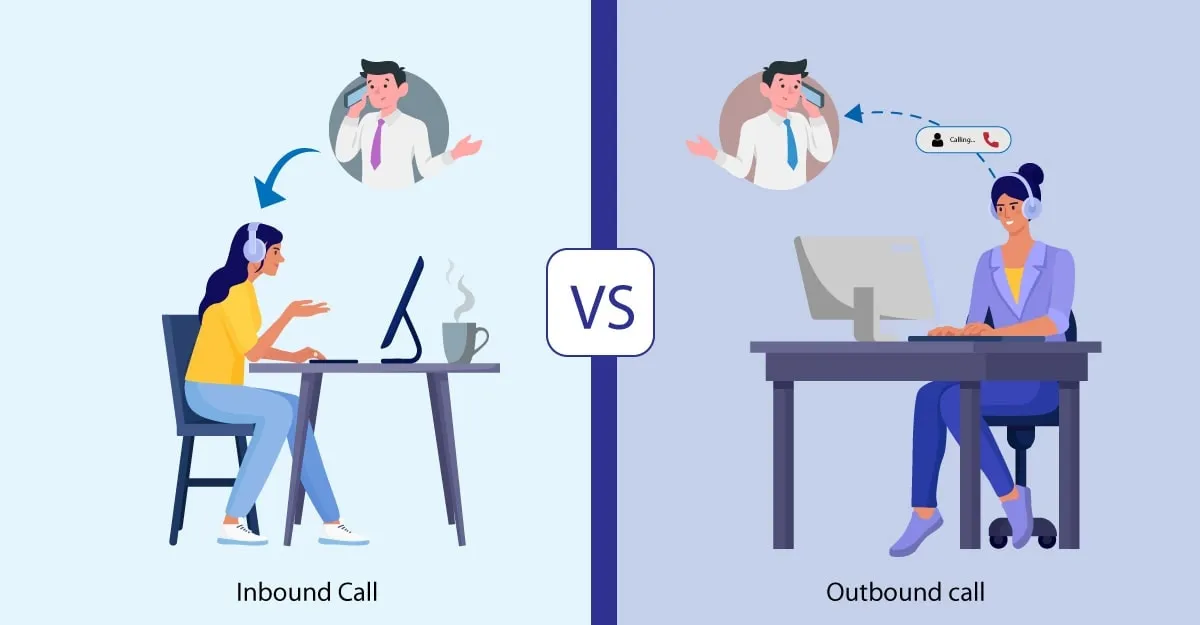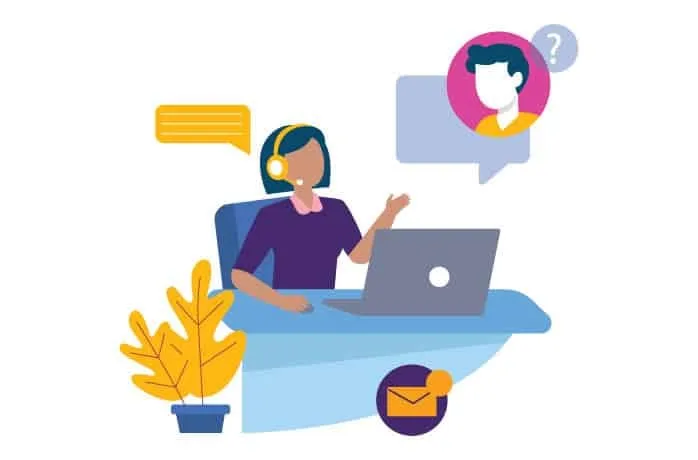An outbound call is a phone call initiated by a business or organization to reach out to existing or potential customers for purposes like lead generation, sales calls, or customer surveys. These calls are typically made by call center agents using advanced call center software to ensure efficiency and track performance.
According to a report by Salesforce, businesses that effectively use outbound calling strategies can see up to a 25% increase in customer satisfaction.
Unlike inbound calls, which are initiated by customers, outbound calls are proactive efforts to engage and build relationships, making them a key element of many companies’ marketing and sales processes.
What Is an Outbound Call?

An outbound call is initiated by a business or outbound call center to connect with potential customers, existing customers, or other contacts.
Unlike inbound call centers, where calls are received, outbound calls focus on activities like cold calls, sales calls, or conducting market research. They play a crucial role in lead generation, customer follow-ups, and resolving queries proactively.
To ensure success, businesses often use outbound calling strategy and specialized tools like outbound call center software.
These calls are part of an organization’s broader efforts to improve customer engagement, generate interest, and deliver their product or service effectively.
How Do Outbound Calls Work?

Outbound calls work through a systematic process in a call center or contact center.
First, call center managers assign tasks to outbound call center agents or call center representatives. These agents use call scripts to ensure consistent messaging and handle outgoing calls efficiently.
Advanced tools like outbound calling software or predictive dialing systems help streamline call flows and increase efficiency. Agents often focus on making outbound calls to connect with prospective customers or re-engage paying customers.
Metrics like agent performance and average call duration are tracked to improve outcomes and enhance overall productivity.
Why Are Outbound Calls Important for Businesses?

1. Reach Potential Customers
Outbound calls help businesses connect directly with potential customers. Through a strategic outbound call strategy, companies can identify individuals who might benefit from their product or service, effectively expanding their customer base.
2. Increase Sales Opportunities
By utilizing outbound sales calls, businesses can proactively engage with customers and identify opportunities for upselling or cross-selling. Well-trained call center agents and sales reps play a crucial role in converting leads into paying customers.
3. Enhance Customer Relationships
Outbound calls aren’t just for selling; they also strengthen relationships with existing and potential customers. Businesses can make marketing calls to share updates about new services or offers, keeping existing customers engaged and informed.
4. Gather Valuable Feedback
Businesses can use outbound calls to conduct customer surveys and collect customer data. This feedback can guide improvements to products or services, enhancing the overall customer experience. Effective call flow ensures these interactions are seamless.
5. Improve Brand Awareness
Making outbound calls is an excellent way to increase brand awareness. Outbound agents can share a company's story and values during phone calls, leaving a lasting impression on both new and existing customers.
6. Follow Up on Leads
Businesses often rely on outbound calls to follow up on leads generated through various channels. By implementing a hybrid call center approach, companies can manage inbound and outbound calls efficiently, improving conversion rates.
7. Improves Customer Retention
Through personalized follow-ups and proactive problem-solving, outbound calls help retain customers. Call center representatives trained in handling inbound vs outbound interactions can make meaningful contributions to customer loyalty and satisfaction.
Outbound calls remain a vital tool for businesses, combining call agents' skills and outbound call centers' efficiency to achieve multiple goals.
Outbound Calls vs. Inbound Calls: What's the Difference?

Inbound call:
An inbound call is when a customer initiates contact with a business by calling its service or support team. These calls typically focus on handling inquiries, resolving issues, or providing information about products or services.
Inbound calls are a reactive approach where agents address customer needs as they arise.
Key Differences:
Best Practices for Making Effective Outbound Calls

1. Prepare a Clear Script
A well-prepared script helps your call center representative to stay focused and consistent during outbound calls. It provides a structured flow for the conversation, ensuring that the key points are covered. This makes it easier for a call center agent to address customer concerns while guiding them toward the desired outcome.
2. Personalize Your Approach
Personalizing your outbound calls creates a connection with the customer. Sales teams should train their call center agents to use customer information, such as their name or previous interactions, to build rapport. This helps make the conversation feel more authentic and relevant, improving the chances of success.
3. Listen Actively
Active listening is crucial in outbound calling. Instead of focusing on what to say next, call center representatives should genuinely listen to the customer’s needs and concerns. This allows them to provide better solutions, address objections, and make the conversation more engaging.
4. Maintain a Positive Tone
A positive tone can make all the difference in an outbound call. Whether the conversation is going smoothly or facing challenges, call center agents should remain upbeat and friendly. A positive tone encourages customer engagement, making them more receptive to your message.
5. Follow Up Consistently
Following up after the initial outbound call is essential for building relationships and closing sales. Sales teams should establish a clear follow-up schedule to ensure that potential customers stay engaged. Regular, timely follow-ups show customers that you are committed to helping them.
6. Track and Analyze Call Data
Tracking and analyzing call data helps a sales team identify patterns and areas for improvement. By monitoring key metrics like call duration, conversion rates, and agent performance, call center representatives can refine their approach, optimize strategies, and improve overall effectiveness in making outbound calls.
How Can Call Center Software Help with Outbound Calls?

Call center software plays a crucial role in enhancing the efficiency and effectiveness of outbound calls. Here’s how it can help:
- Automates Outgoing Calls: Call center software automates the process of making outgoing calls, saving time for call center agents and ensuring that more calls are made to prospective customers.
- Predictive Dialing: Advanced outbound calling software uses predictive dialing to connect agents to the next available call, reducing downtime between calls and improving productivity.
- Call Scripts and Data Integration: It provides call scripts and integrates customer data, helping call center representatives deliver personalized conversations, boosting the chances of successful interactions.
- Track and Manage Outbound Calls: The software enables call tracking, making it easier to monitor outgoing calls and gather insights about performance. This data can be used to improve future calls and agent performance.
- Incorporates Inbound and Outbound Call Data: Many call center systems integrate both inbound and outbound calls into one platform, making it easier for agents to handle all types of calls efficiently.
- Complies with Regulations: Outbound call centers can ensure compliance with regulations like the Telephone Consumer Protection Act (TCPA) by using call center software that limits certain types of calls.
By using call center software, businesses can streamline their outbound calling process, increase productivity, and improve customer engagement.
Common Challenges in Outbound Calls and How to Overcome Them

1. Handling Rejection Gracefully
Rejection is a natural part of outbound calls, especially during cold calling. It's important for call center agents to stay calm and not take it personally.
Instead of focusing on the rejection, they should use it as a learning opportunity to refine their approach. Remaining positive can help maintain a professional demeanor during outgoing calls.
2. Dealing with Gatekeepers
Often, outbound call centers face challenges when dealing with gatekeepers who prevent access to decision-makers.
One way to overcome this is by building rapport with the gatekeeper and offering relevant, value-driven information. This can make them more inclined to pass the call along to the right person.
3. Overcoming Low Conversion Rates
Low conversion rates can occur when outbound agents aren't effectively engaging prospects. Improving call scripts and focusing on clear value propositions can help sales teams convert more leads.
Additionally, data from outbound call center software can provide insights into patterns that need adjustment.
4. Managing Long Call Times
Long call durations can impact productivity. Outbound call centers can address this issue by implementing time management strategies, such as using call center software to track average call flow and set realistic call duration goals.
5. Staying Compliant with Regulations
Outbound calling comes with various regulations, including the Telephone Consumer Protection Act. To avoid issues, call center representatives should stay updated on rules regarding outbound calls and ensure their processes are compliant.
6. Maintaining Motivation in Cold Calling
Cold calling can be tiring and demotivating, especially when faced with frequent rejections. Call center agents can stay motivated by setting small, achievable goals and celebrating wins, regardless of the call outcome.
How Outbound Calls Improve Customer Engagement and Sales

- Direct Interaction: Outbound calls allow businesses to directly connect with potential customers, offering personalized interactions that can build stronger relationships.
- Immediate Feedback: Call center agents can quickly gather customer insights, addressing concerns or queries in real-time, which boosts engagement and satisfaction.
- Targeted Outreach: With well-planned outbound calling strategies, businesses can reach specific existing customers or prospective customers who are more likely to convert, improving sales.
- Personalized Offers: Outbound sales calls enable businesses to offer tailored solutions, driving higher interest in products or services.
- Increased Trust: Direct contact through outbound calls can increase trust, as customers feel valued and heard, leading to higher conversion rates.
Conclusion
Outbound calls are a valuable tool for businesses to reach out to potential and existing customers. By understanding how they work and implementing effective strategies, companies can enhance customer engagement, boost sales, and build stronger relationships.
With the right approach, outbound calls can significantly contribute to business growth.

.webp)



.jpg)

.jpg)
